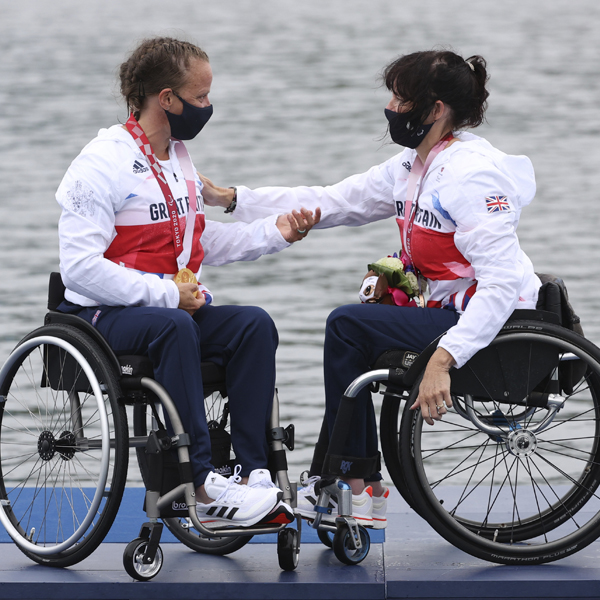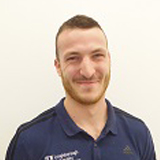Creating more opportunities in Parasport
Shaping new events and rules - and safeguarding the health of Para-athletes
Sport is an exceptional vehicle for stimulating confidence, self-efficacy and improving quality of life for everyone – including people with a disability.

Indeed, there is clear evidence that exercise and physical activity significantly improve the health and wellbeing of people living with a disability.
Working with international partners as well as GB teams, researchers from Loughborough’s Peter Harrison Centre for Disability Sport have played a critical role in shaping new events and rules as well as safeguarding the health of Para-athletes.
Our research partnerships have also improved the number of sporting opportunities for people with disabilities worldwide.
Banner image: ParalympicsGB beat USA to win first wheelchair rugby gold in Tokyo
Image (right): ParalympicsGB's Emma Wiggs (left) and Jeanette Chippington win Gold and Bronze in the Para Va’a
Both images: © ParalympicsGB
Our impact
Paracanoe
- Our research supported a new classification system for Para Va’a which led to the IPC’s decision to include it at the Tokyo Games, where ParalympicsGB's women won Gold and Bronze.
- UK Sport subsequently increased its funding to Paracanoe by 27%.
Paratriathlon
- Our research into thermoregulatory responses led to a policy change in 2019, safeguarding athletes during competitions in warm climates.
- We contributed to the ITU’s Beat the heat which offers guidance to athletes preparing for competitions in warm environments.
- The incidence of cases of heat-related illnesses dropped during the 2019-20 season.
Wheelchair basketball
- Our research contributed to the official IWBF 3x3 wheelchair rules (2019), improving opportunities for players worldwide.
- The IWBF also used our research to select half-court 3x3 wheelchair basketball as the most appropriate format for world major events, including the 2022 Commonwealth Games.
- In collaboration with British Wheelchair Basketball and the International Wheelchair Basketball Federation (IWBF), our research played a critical role in the development of the Minimum Impairment Criteria to ensure that the sport remains part of the Paralympic programme for Paris 2024.
- In January 2024, the IWBF announced that it had received official confirmation of its compliance with the IPC’s Classification Code – ensuring the continued inclusion of wheelchair basketball in the upcoming Paralympic Games.
Wheelchair rugby
- Our research has helped to identify and confirm talent within the sport, and embed research to enhance the performance and well-being of players in the GB squad.
- We provided physiological support to the squad in its Tokyo quest, where ParalympicsGB won Gold – the first-ever wheelchair rugby Paralympic medal achieved by any European team.
The research
The International Paralympic Committee (IPC) requires sports included in the Paralympic Games to have an evidence-based classification system.
Working with the Swedish School of Sport and Health Sciences and the International Canoe Federation (ICF), we explored how athletes with different impairments paddle compared to able-bodied athletes. Our insights formed the basis for the new evidence-based classification system – the first of its kind.
Our indoor tracking system (ITS) – developed in collaboration with UK Sport, English Institute of Sport, McLaren Applied Technologies and Para Sport governing bodies – uniquely quantified the activity profiles of indoor wheelchair sports. Using the ITS, we have informed the format of 3x3 wheelchair basketball – widening global participation and establishing it at major world sporting events.
We also steered significant developments in safeguarding the health of Paratriathletes which has led to International Triathlon Federation policy changes.
The Paralympic Games in Rio 2016 saw the British Team collect medals across more categories than any other nation, this could not have been delivered without the support this Parasport research at Loughborough University has given us.
Research funders
- British Triathlon
- Loughborough University
- Peter Harrison Foundation
- UK Sport
Development partners
- English Institute of Sport
- McLaren Applied Technologies
- Para Sport governing bodies, including the International Canoe Federation, International Triathlon Union and Wheelchair Basketball Federation
- Swedish School of Sport and Health Sciences


